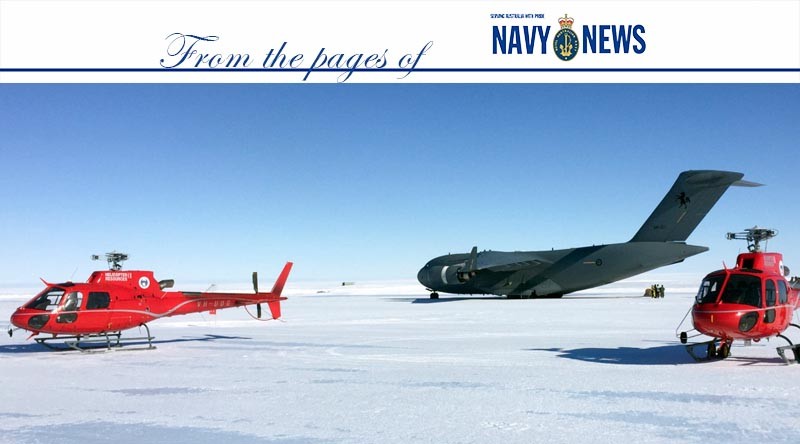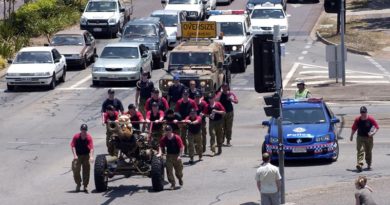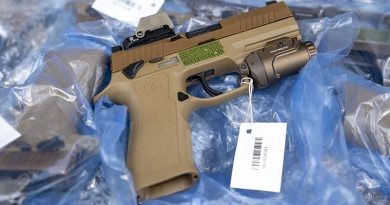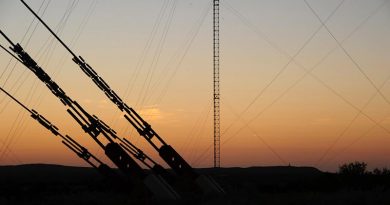723 Squadron on ice

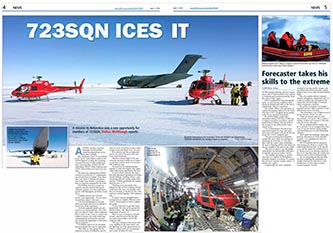
A mission to Antarctica was a rare opportunity for members of 723SQN
Dallas McMaugh reports
Photos by Leading Seaman Tim Graham
ANYONE needing a Squirrel helicopter recovered from Antarctica should look no further than 723SQN.
The maintainers from 723 are definitely the “go-to” team when it comes to the AS350 Squirrel, so when the Australian Antarctic Division (AAD) needed assistance removing three of them, LSATA Jodie Khan, POATA Mark Anderson and LSATA Tim Graham were given the rare task.
The team was collected from HMAS Albatross in an RAAF C17 Globemaster aircraft and flown to Hobart. From there they were taken to Wilkins Aerodrome near South Casey Station, a permanent base in Antarctica managed by the AAD.
The Wilkins runway is located on a glacier and only operates during the Antarctic summer, so it was important to get the AAD helicopters out before winter set in.
LS Khan said she was “over the moon” at the opportunity. “It was a oncein-a-lifetime chance,” she said.
“I’m from Queensland so I’m definitely not used to that level of cold but it was all part of the experience.
“Even the departure briefs were different to our usual guidelines. The AAD gave us videos to watch, which explained how to dress to stay warm, to vacuum our clothes to remove any seeds which may contaminate the environment, and they also stressed the importance of not touching the penguins.”
 LS Graham said it was an adventure that most people don’t get to experience.
LS Graham said it was an adventure that most people don’t get to experience.
“But while we were going into the unknown in terms of wilderness and climate, we were on familiar territory when it came to the task ahead of us,” he said.
PO Anderson said the pre-departure period was intense because of the relatively small timeframe.
“Morale is always high at 723, and everyone was keen to help out in whatever way they could to ensure our success, “PO Anderson said.
“Everyone at the Squadron pulled together to make this happen, they appreciated what a great opportunity this was.”
As well as their expertise, the team provided specialised equipment including aircraft lashings, handling wheels, a special towing arm and loading ramps developed by 723SQN specifically for loading Squirrels into a C17.
“Working on ice presented a few unknowns, but we were working with the AAD team who were very familiar with that environment, so the RAAF, the AAD, and Navy worked together,” PO Anderson said.
“It wasn’t entirely straightforward; our Squirrels are slightly different to the AAD’s, which meant we had to readjust the ramps.
“It was a bit tricky to get them lined up perfectly. We were on the ground for just five hours, with 20km/h winds and temperature of minus 17c.
“But we were so focused on the job it wasn’t until the end of the day that we could stop and take it all in,” PO Anderson said.
“We were waiting on the runway and I was shuffling in the snow when I saw the light blue ice of the glacier below us which is when I really got my bearings, and a sense of where we were.”
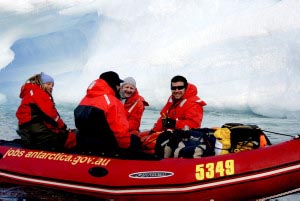
Forecaster takes his skills to the extreme
By LCDR Peter Croce
AFTER months enduring sub-zero temperatures, LEUT Wade Lamberth has returned to Australia and is enjoying wearing “boardies and a T-shirt” again.
LEUT Lamberth has been braving blizzards, ice and freezing conditions while plying his professional skills as the Navy’s meteorology officer in Antarctica.
The warfare officer, who specialises in weather forecasting, deployed to the South Pole late in 2015, wrapping up his tasking in the frozen continent last month.
He said the highly sought-after Australian Antarctic Division (AAD) role to support Australian researchers, mainly based at Davis Station, took his skills to the extreme in one of the world’s most remote areas.
“As a meteorologist, this job is awesome and certainly my time and experiences here will remain with me for the rest of my life,” LEUT Lamberth said.
“You get everything from beautiful crystal clear days where the icebergs are glistening out in the bay, to a few days later when the wind is quite exfoliating, the snow is blinding and the only thing you can do is huddle in the mess to stay warm.
“My job is to ensure I give the people working here the best possible indication of what the upcoming weather will be.
“The weather can change so quickly down here, so whether for field parties, scientific research, or aviation, it’s critical they all know what the weather will do – I usually get it right!”
A typical day for LEUT Lamberth included reviewing satellite imagery, taking observations from automatic weather stations and a twice- daily weather balloon flight.
Once the weather balloon responds with the atmospheric temperature data, he is able to combine the information with model data and knowledge of localised effects to generate a forecast.
He said the Australians were highly regarded and were able to provide a confident forecast out to four days.
“The team places a lot of faith in you to get the forecast correct,” he said.
“There are projects that are really time critical, so it can be vital to ensure a weather window isn’t missed, or that they won’t be hit by a blizzard.
“It’s so isolated and the weather can be so extreme. I’m not exaggerating when I say if I get the forecast wrong, people may find themselves in a life-threatening situation.
“But I enjoy the challenge, taking that pressure and using it to focus and push yourself – it’s something my time as a MWO taught me.”
LEUT Lamberth said his interest in forecasting came about as a result of the relationship between how we do our job at sea and the impact the weather has on us. Being at sea is an amazing experience but not so enjoyable when the weather has closed in and a swell is rolling through.
“It’s an interesting job that has taken me from compiling the information on weather forecasts for land forces in the Middle East, to Navy ships in waters around Australia,” he said.
.
.
.
.
.
.

.
.

